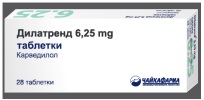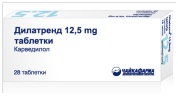-
Dilatrend – the different Beta-blocker
November 25, 2014


As results from the meta-analysis published in the journal American Journal of Cardiology have shown, compared with other beta-blockers (BB), carvedilol displays some additional benefits (improved prognosis) in patients with heart failure (HF) and acute myocardial infarction (AMI).The guides for conduct for acute coronary syndrome, AMI and HF recommend BB as drugs of first choice, but do not give specific preferences for a particular drug from this class to others.
The pleiotropic effects of carvedilol (antioxidant and vasodilator) distinguish it from other medicines, which are often prescribed, the beta-1 selective BB (atenolol, bisoprolol, metoprolol and nebivolol). This gives a handle to a group of American authors to conduct a large-scale meta-analysis to test the hypothesis whether carvedilol shows advantages over other BB.
The meta-analysis included 11 randomized clinical trials comparing carvedilol directly with one of the other BB – three of which in a population with AMI and eight in patients with systolic heart failure. The total number of participants was 5207, where the biggest of the included trials was COMET (Carvedilol Or Metoprolol European Trial), comparing carvedilol with metoprolol in 3029 patients with HF.
During the average follow-up of 12 months it was shown that carvedilol significantly reduced by 25% the overall mortality in patients with HF compared to other beta-1 selective BB (24.1 to 28.6%).
A similar effect in terms of mortality was observed in the population with AMI, but not with all the options of statistical analysis. In the case of systolic heart failure, carvedilol should be considered as the BB of first choice.
The incidence of hospitalizations for heart failure and non-fatal MI is not affected by the choice of BB, which means that in some way carvedilol has a priority impact on mortality.The explanations of the authors of this fact is that carvedilol has proven antiarrhythmic effects which are not so pronounced in the other drugs of this class, and possibly lead to a reduction in sudden cardiac death and the total mortality after an experienced AMI or in the presence of HF.
The results of the meta-analysis described are supplemented by those of the subanalysis study MADIT-CRT (Multicenter Automatic Defibrillator Implantation Trial with Cardiac Resynchronization Therapy), published in the Journal of the American College of Cardiology, which showed that the treatment with carvedilol was associated with a statistically significant 30% reduction in the incidence of the composite indicator (hospitalization for heart failure or mortality) compared with metorpolol.
The MADIT-CRT study was published in 2009. It included patients with mild heart failure or asymptomatic left ventricular systolic dysfunction in the presence of asynchrony in the contraction of the left ventricle (wide QRS complex).
The main results of the study were that the resynchronization therapy (CRT), added to the implantable cardioverter defibrillator (ICD) within the limits of the primary prevention reduced the risk for adverse events, associated with HF, by about a third within an average follow-up period of 2.5 years.
The new analysis of the MADIT-CRT, published in 2013, included 1515 participants with left ventricular ejection fraction / = 130 ms and functional class of HF under NYHA I or II. The average follow-up period was 3.4 years.
The reduction in the incidence of the primary final point of the trial, which was mentioned above, was mainly on account of the reduction of hospitalizations for HF. The benefits of carvedilol to metoprolol were more pronounced in the subgroup with an implanted resynchronization device-defibrillator (CRT-D) – a reduction of the primary final point by 39%, as well as in patients with the presence of left bundle branch block (LBB).
When combining the two conditions (LBB and applied CRT-D) the reduction in the combined incidence of hospitalization for heart failure and mortality reached 49%. Another finding of this additional analysis was that the benefits associated with taking carvedilol showed a clear dependence on the administered dose, while such a link has not been proven in relation to metoprolol.
Tchaikapharma – High Quality Medicines Inc. produces licensed Dilatrend (carvedilol) and is a Marketing Authorization Holder of the product.
Dilatrend has been in the list of NHIF since 16.11.2014, with the following codes:
Dilatrend 6.25 mg x 28 tabl. CG 221
Dilatrend 12.5 mg x 28 tabl. CG 220
Dilatrend 25 mg x 28 tabl. CG 219

